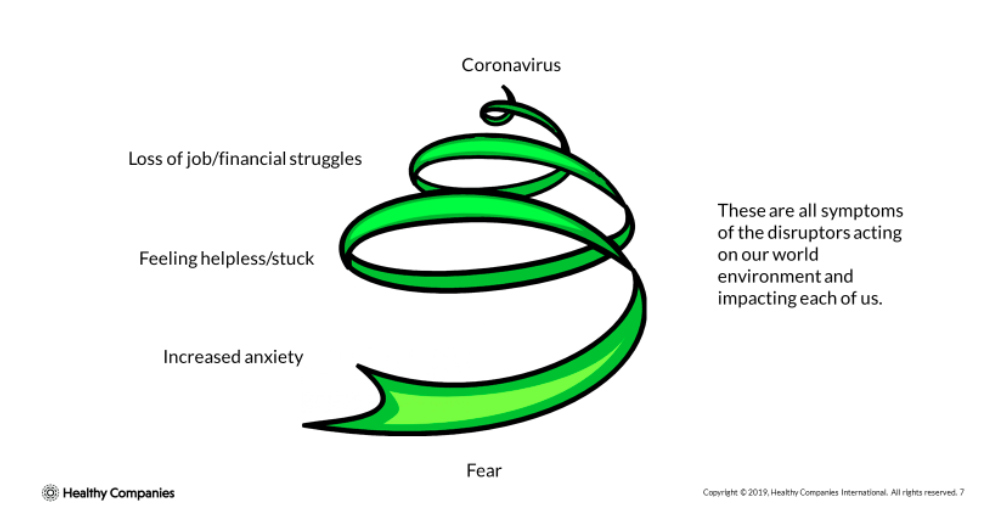Authored by Rick Auman, Joy Goldman, and Petra Plazer
As we’ve been working with and interviewing clients, we consistently hear the following adjectives: “overwhelmed,” “exhausted,” “concerned,” “afraid,” “unprecedented,” “new normal,” “revenue and survival concerns,” “acceleration,” “re-imagining…” Is this really new due to COVID 19? Our research tells us not. We’ve studied the disruptors relevant to ALL cultures and the corresponding behavioral attributes of leaders that are predictors of success during these times. We’ve shown that there are six dimensions that form the foundation of who you are as a leader/ human being (what we call Grounded Leadership), and that contribute to optimal performance outcomes while maintaining well-being for all. But for this blog, we’re going to concern ourselves with what happens to us to cause those emotions we mentioned above.
For many of us, the disruption of the coronavirus pandemic has created more turmoil, unrest, and discomfort than perhaps any other time in our lives. For some, the level of uncertainty with no real end in sight has created a sensation of being stuck. Odd to be feeling stuck at a time when the whole world seems to be erupting in chaos, but there it is. So, let’s examine what happens to us that creates this feeling of being “stuck” …

When the reality of the coronavirus hit us, there was an obvious concern for our health. How do I protect my health and the health of my loved ones? Answer: we don’t know. This became the starting point of a downward spiral as we then had to face the possibility of losing our job, the concurrent financial struggles, and again we were faced with no real answers. The spiral continued, increasing our levels of stress and anxiety until we find ourselves in the grip of all-out fear. This is the place where many of us are stuck: in the grip of all-out fear.
This is not to dismiss the severity of the challenges that many of us are facing; the realities of what people are facing are daunting and there are no easy solutions. But we need to understand why we are stuck if we are to continue the fight in finding a path forward. What happens to us physiologically that causes this stuck feeling. The simple answer is that we’ve been hijacked by our emotional brain.
Not to get too technical, but for a simple explanation of how our brain works, consider this: our body takes in stimuli from our environment through our five senses 24/7; these stimuli are processed through the primitive brain for “fight or flight” response and then sent to our emotional brain. The emotional brain tells us whether to be happy, sad, scared, etc. and sends on this “story” to our executive brain. It’s this part of our brain that is responsible for logic, critical thinking, planning, etc. Got that?
Now, when we are in the grips of this all-out fear, stress, and anxiety, our emotional brain takes over; it’s trying to protect us from the story it’s been telling us. However, when we get hijacked by our emotional brain, we often cannot access our executive brain! So, finding a path forward becomes even more difficult, leading to more anxiety, stress, and fear, which causes us to spiral down, etc.
So, what can we do to try to overcome this emotional hijacking, so that we might start to find that path forward? There are quite a few things that you might try, but remember, the goal is to be able to adequately access our executive brain. The tips below won’t solve all your problems, but they can help reduce emotional hijacking!
- Breathe. Sounds simple, but physiologically speaking, it’s one of the best things you can do for yourself when your emotional brain takes over: take some deep cleansing breaths and give some extra oxygen to your brain. You’ll find the emotions recede a bit when you do this and your cognitive (thinking) functions improve.
- Explore the story your emotional brain is telling you. Fact check it. How much of it is hard reality and how much of it hasn’t occurred, but we’re deathly afraid it might? How is the exact opposite story equally as possible as the catastrophic one you’ve created? Sometimes our fear of what might happen someday overwhelms us, and that’s when we get stuck.
- Look for ways to access your positive, optimistic emotions and try to focus on those as an alternative. What do you still have in your favor? Close personal relationships? Roof over your head? Finding those positive emotions can loosen up the hold of our emotional brain, shifting the story we’re telling ourselves enough to get our executive brain working.
- Focus on the things you can control. When we allow our brain to mull too much on things that we have no control over, we are making room for our emotional brain to take the wheel.
- Find some quiet time. Prayer, meditation, or just silence, even for a few minutes, can give your brain the opportunity to reset, and allow your executive brain to step up to the task of finding you some options for dealing with all this uncertainty.
- Remember and align with your overarching purpose: When we remember what we want to create instead of focusing on what we want to avoid, natural energy and passion propels us forward. If our military soldiers focused on their fears, we’d never survive battles. It’s an inspiring vision and loyalty to cause that ignites courageous action.

Petra Plazer, COO, SixSEED Partners, Healthy Companies Certified Facilitator
Rick Auman, EVP Consulting Services and Global Facilitator Network Lead, Healthy Companies
Joy Goldman, CEO, SixSEED Partners, Healthy Companies Certified Facilitator





